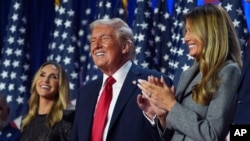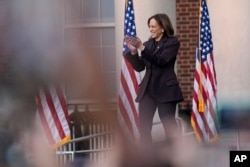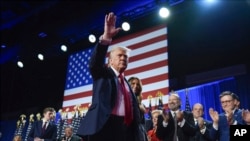Donald Trump’s agenda calls for him to deliver on key campaign talking points: improving border security, strengthening the economy and putting America first. While his promises are bold, details on how they’ll be carried out are few. Tina Trinh reports.
2024 US Election
Thursday 7 November 2024

Political polls leading up to this week's U.S. presidential election showed a tight race between former President Donald Trump and Vice President Kamala Harris. But Trump pulled off a resounding win across several demographic groups, securing critical battleground states that often determine the outcome of U.S. presidential contests.
Trump held on to his base of voters while making gains with several groups that traditionally vote for Democrats, including young Black men, Latino men and young people, according to an analysis by The Associated Press.
"They came from all corners — union, nonunion, African American, Hispanic American, Asian American, Arab American, Muslim American," Trump said after declaring victory early Wednesday. "We had everybody."
Trump, who was convicted on 34 felony charges for falsifying business records in May, is now poised to become the first Republican presidential candidate in 20 years to win the popular vote. In addition, in May 2023, a federal jury found Trump liable for sexually abusing former columnist E. Jean Carroll and subsequently defaming her.
"It is interesting, over the course of recent political history, why certain things land, certain things don't," said Samuel Abrams, a professor of politics and social science at Sarah Lawrence College in New York.
"Why some candidates are Teflon-covered and others are not. Why Donald Trump's record, for instance, of infidelity and problems with some of the criminal stuff has not stuck to him."
What has stuck is Trump's messaging and his ability to successfully tap into the concerns of many Americans across numerous demographics.
"And that is, 'I hear you. I understand your struggle. I understand that things are not as good as they could be, and I'd like to help you out. I'd like to make it easier. I'm interested in helping you put more money in your wallet or pocketbook,' " Abrams said.
"The press and the media like to talk about some of the crazy things he said and all of that, but at the end of the day, it's been a very strong America First message and a message of, again, 'I know what you need, and I'm here to help you.' "
Trump's campaign targeted key audiences, often through podcasts and social media. His appearance on the "Joe Rogan Experience" podcast has drawn almost 47 million views on YouTube.
"They targeted young men. They targeted those that didn't vote. They targeted those individuals that, you know, have struggled under the last several years of inflation, and that's paid off," said Thom Reilly, a professor at the School of Public Affairs at Arizona State University.
Harris had about 100 days to run her campaign after President Joe Biden withdrew from the race in July — a rush toward Election Day that may have hurt her chances.
"I think the real challenge that the Harris campaign had was that she had a very compressed period of time in order to run her campaign," Reilly said, "and she really struggled with, one, distancing herself from Biden, particularly around his economic policy, but also with developing a convincing summary of her agenda dealing on critical issues like immigration and like the economy."
Harris' inability to distance herself from an unpopular president may have hurt her chances.
"It was clear that the American public wanted change," Reilly said, "and for many individuals, they saw this as a continuation, for good or bad, of the Biden administration."
Harris also didn't have to compete in any primaries in 2024, because Biden withdrew after the primary season ended. Primaries are statewide contests in which voters select candidates for the general election.
"I think it was an enormous mistake to have not put her through that test of fire," Abrams said, "because the whole point is to expose weakness and see if they can do it."
Other analysts have said Harris focused too much on abortion rights and too little on the economy.
"Clearly, that was a driving and polarizing issue that impacted a lot of voters. But when you step back at the end of the day, far less than 1% of American voters are ever going to have to deal with abortion directly or indirectly," said Republican strategist Jason Cabel Roe. "All voters have to deal with inflation, gas prices, home energy prices, less take-home pay."
It's difficult to know how much, if at all, being a woman of color hurt Harris. Thirty percent of people polled by Pew Research before the election said that Harris' gender would be a liability at the polls.
"I don't think, quite frankly, that this really had to do with race and ethnicity or gender at all this time around," Abrams said. "The messaging that Trump had really resonated just much more deeply than Harris for so many of these voters around the country."




























